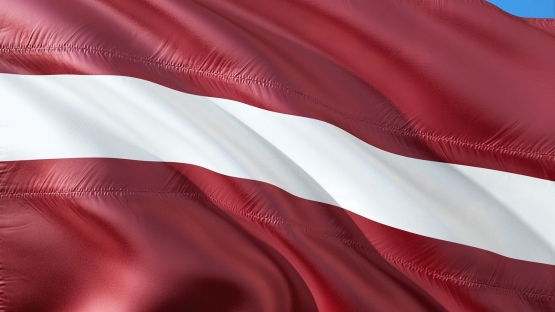Flag of Latvia (RonnyK/pixabay.com)
An International Atomic Energy Agency (IAEA) team of experts said Latvia is committed to the safe and responsible management of radioactive waste and noted areas for improvement, including the need to further develop long-term management plans and associated costs.
The Integrated Review Service for Radioactive Waste and Spent Fuel Management, Decommissioning and Remediation (ARTEMIS) team today concluded an eight-day mission to the Republic of Latvia. Requested by the Government, the mission was hosted by the Ministry of Environmental Protection and Regional Development. The mission's counterparts also included the Latvian Environment, Geology and Meteorology Centre (LEGMC), which manages the country's radioactive waste, and the regulatory body, the Radiation Safety Centre of the State Environmental Service (RSC SES).
ARTEMIS missions provide independent expert advice from an international team of specialists convened by the IAEA. Reviews are based on the IAEA safety standards and technical guidance as well as international good practices. The mission aimed to help Latvia meet European Union obligations that require an independent review of national programmes for the management of radioactive waste and spent fuel.
Latvia uses radiation sources in medical, scientific and industrial applications, as well as in science and research. The country also has one research reactor near the town of Salaspils, around 25 km from the capital Riga. The reactor has been partly dismantled after it was shut down in 1998 and now awaits final decommissioning. The fresh and spent nuclear fuel from the reactor was returned to the Russian Federation in 2005 and 2008, respectively, so Latvia has no nuclear fuel to manage. Since 1962, Latvia has operated a near surface disposal facility for low and intermediate level radioactive waste at a site in the town of Baldone.
The ARTEMIS team said Latvia has established a good basis for the safe and responsible management of radioactive waste. The team highlighted the strong commitment of LEGMC and RSC SES to implement a national waste management strategy, particularly in light of the planned decommissioning of the Salaspils research reactor.
"The foundations for a robust infrastructure for the safe management of radioactive waste in Latvia are well established," said ARTEMIS team leader David Ulfbeck, Senior Adviser for Radiation Protection at the Danish Health Authority. "The mission's recommendations and suggestions will help Latvia ensure a high level of safety for radioactive waste management."
Latvia is preparing a new Environmental Policy Framework for 2021-2027, setting priorities and direction for the continuous safe management of all classes of radioactive waste. The team noted that the country's strategy for radioactive waste management is undergoing revisions to address the long-term objectives defined in this policy.
The team also provided recommendations and suggestions to enhance the national radioactive waste management strategy, including:
- The Government should ensure that the strategy includes long-term options for the management of radioactive waste as stated in the new Environment Policy Framework for 2021-2027.
- The Government strategy should take into account the interdependency between different actions, such as decommissioning, pre-disposal and disposal activities.
- The Government should evaluate existing provisions in the strategy to ensure its timely and full implementation.
The team comprised four experts from Republic of Cyprus, Denmark, Hungary and Portugal as well as three IAEA staff members. The team held meetings with officials from the Ministry of Environmental Protection and Regional Development, LEGMC and RSC SES in Riga.
"The recommendations provided by a team of highly experienced and professional experts encourage us and support our efforts to further develop Latvia's radioactive waste management policy and strategy," said Rudite Vesere, Director of the Environmental Protection Department at the Ministry of Environmental Protection and Regional Development. "The findings recognize Latvia's efforts so far to establish a well-managed system and highlight aspects and recommend actions that would contribute to further improvements."
"This mission provides feedback that will help further improve the development and implementation of Latvia's radioactive waste management programme," said Joanne Brown, IAEA's Unit Head for Assessment and Management of Environmental Releases, adding that Latvian counterparts were well prepared for the mission and transparent in their discussions.
The final mission report will be provided to the Government in about two months.
About ARTEMIS
ARTEMIS is an integrated expert review service for radioactive waste and spent fuel management, decommissioning and remediation programmes. This service is intended for facility operators and organizations responsible for radioactive waste management, as well as for regulators, national policy makers and other decision makers.







